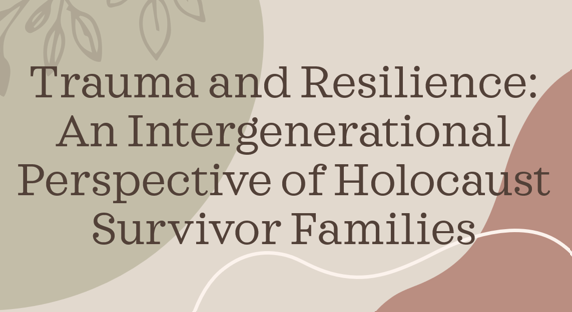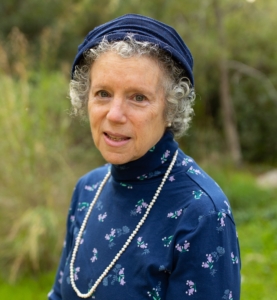

Trauma and Resilience: An Intergenerational Perspective of Holocaust Survivor Families
May 16 @ 9:00 am - 12:00 pm
Trauma and Resilience: An Intergenerational Perspective of Holocaust Survivor Families
Friday, May 16, 2025
Registration 8:30am Program 9am to 12pm
Presented By: Bea Hollander-Goldfein, Ph.D. and Nancy Isserman Ph.D.
Location: Online Workshop
***Deadline to register is May 14. 2025 at 9am***
3 CE Credits
Through in-depth life histories of Holocaust survivors, their children and grandchildren, the Transcending Trauma Project has examined the coping and adaptation strategies utilized by survivors to rebuild their shattered lives and how this impacted subsequent generations. By exploring the experience of survivor families from the inside out, in their own words, with their own attributions of meaning and importance, we have a unique view of the struggle to rebuild life, how it works when it is successful and what happens when it fails. TTP has gained a unique perspective on the intergenerational impact of extreme trauma and on the process of recovery that takes on different forms as it moves from survivor parent to child, to grandchild. The presentation will explain the observed patterns of transformative narratives, the mediating parent, the balance of self-oriented needs vs. other oriented needs, the experiencing of “burden” and how this affects the development of self, and the impact of open vs. closed communication.
In examining the Transcending Trauma Project research family relationships were key to understanding political beliefs and also aging in Holocaust survivors. Through grounded research methodology and the secondary analysis of eighteen in-depth life narratives, factors were identified that contributed to tolerance versus factors that contributed to intolerance in their lives in post-war life. While there are other factors influencing political beliefs including the quality of attachment, a strong relationship was found between quality of family relationships, psychological insecurity, and intolerance. Family relationships also contributed to the impact of the Holocaust on aging survivors and their children. While children who experienced positive parent-child relationships mentioned negative coping strategies, they also spoke positively of the impact of their parents in their own lives and expressed empathy for their parents. In the families where tensions existed between the survivors and their children, the children did not express empathy for their aging parents.
Objectives:
1. Assess within Holocaust survivor families, the relationship dynamics that promote intergenerational transmission of trauma or resilience.
2. Describe particular patterns in Holocaust survivor families that affect the identity, belief systems and emotional functioning of the children through communication, transformative narratives and mediating parents.
3. Analyze the concepts of tolerance and intolerance and understand how they relate to what survivors think and feel about their perpetrators.
4. Identify patterns of interaction between aging Holocaust survivors and their children.
 Bea Hollander-Goldfein, Ph.D., LMFT, CCTP is a senior staff therapist at the Council for Relationships, an AAMFT approved supervisor and an instructor in the Post Graduate Certificate Program in Marriage and Family Therapy. She is also credentialed as a Certified Clinical Trauma Professional. She is the Director of the Transcending Trauma Project which is a large scale research program investigating coping and adaptation after extreme trauma. Bea is licensed as a Clinical Psychologist and as a Marriage and Family Therapist. She is also a member of the American Family Therapy Association. Bea received her doctorate in psychology from Teachers College, Columbia University and subsequently expanded her training to include certification in Marriage and Family Therapy. Systemic theory has guided her clinical practice and research activities for over 30 years. She has presented broadly on the topic of trauma and the importance of an integrated model of coping and adaptation. She has published in the fields of Marriage and Family Therapy and Trauma studies.
Bea Hollander-Goldfein, Ph.D., LMFT, CCTP is a senior staff therapist at the Council for Relationships, an AAMFT approved supervisor and an instructor in the Post Graduate Certificate Program in Marriage and Family Therapy. She is also credentialed as a Certified Clinical Trauma Professional. She is the Director of the Transcending Trauma Project which is a large scale research program investigating coping and adaptation after extreme trauma. Bea is licensed as a Clinical Psychologist and as a Marriage and Family Therapist. She is also a member of the American Family Therapy Association. Bea received her doctorate in psychology from Teachers College, Columbia University and subsequently expanded her training to include certification in Marriage and Family Therapy. Systemic theory has guided her clinical practice and research activities for over 30 years. She has presented broadly on the topic of trauma and the importance of an integrated model of coping and adaptation. She has published in the fields of Marriage and Family Therapy and Trauma studies.
 Nancy Isserman, MSW, Ph.D. is the Co-Director of Transcending Trauma Project (TTP) at Council for Relationships (CFR) since 1993. TTP is a qualitative research project, consisting of in-depth interviews of 306 Holocaust survivors and three generations of family members on coping and adaptation pre, during and after World War II. Dr. Isserman is a co-author of Transcending Trauma: Survival, Resilience, and Clinical Implications in Survivor Families (Routledge, 2012). She has published articles, book reviews, co-edited books, and lectured on topics relating to trauma and Holocaust survivors, military culture, and the transmission of trauma in military families. She is part of the Holocaust and Genocide Studies faculty at Gratz College teaching The Psychosocial Impact of the Holocaust on Survivor Families and The Psychology and Sociology of Altruism and Rescue. She will co-teach a new course in the spring 2025 on qualitative research.
Nancy Isserman, MSW, Ph.D. is the Co-Director of Transcending Trauma Project (TTP) at Council for Relationships (CFR) since 1993. TTP is a qualitative research project, consisting of in-depth interviews of 306 Holocaust survivors and three generations of family members on coping and adaptation pre, during and after World War II. Dr. Isserman is a co-author of Transcending Trauma: Survival, Resilience, and Clinical Implications in Survivor Families (Routledge, 2012). She has published articles, book reviews, co-edited books, and lectured on topics relating to trauma and Holocaust survivors, military culture, and the transmission of trauma in military families. She is part of the Holocaust and Genocide Studies faculty at Gratz College teaching The Psychosocial Impact of the Holocaust on Survivor Families and The Psychology and Sociology of Altruism and Rescue. She will co-teach a new course in the spring 2025 on qualitative research.
PSCP: The Psychology Network is approved by the American Psychological Association to sponsor continuing education for psychologists. PSCP: The Psychology network maintains responsibility for this program and its content.
